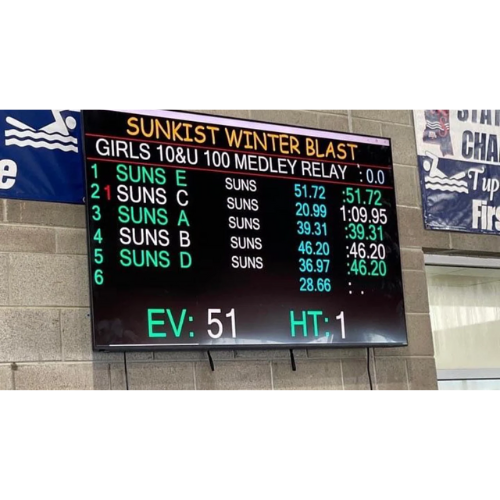- The Swimnerd Newsletter
- Posts
- How Emma Igelström is Helping to Transform Swimming in Saudi Arabia
How Emma Igelström is Helping to Transform Swimming in Saudi Arabia
“They have their first female Olympic swimmer ever now in Paris, which, of course, she’s been a big role model for the girls in the country.” - Emma Igelstrom
Help preserve our sport's history by becoming a monthly donor to the International Swimming Hall of Fame like us.
How Emma Igelström is Transforming Swimming in Saudi Arabia
Emma Igelström never expected to find herself in Saudi Arabia, pioneering swimming programs in a country where female competition only began three years ago. But the former world champion breaststroker and the first woman to ever break 30 seconds in the 50 SCM Breaststroke, has always been drawn to challenges.
“I went into those clubs, I saw the pool is empty. I mean, there was no people in the pool. And for me, coming from Sweden, I mean, we have a lack of facilities. We’re fighting for having, you know, times in the pool, more lanes and everything. That was like, you know, a dream.”
Now, she’s on a mission to change that.
Emma’s Career & Swimming’s Evolution
Emma’s career unfolded during a turning point in swimming. She remembers a time when training was a numbers game - grinding through meters until only the toughest survived.
“I still was in the shift of the generation of, you know, swim as many meters as you can, as many hours as you can, and for those who made it, they went good. Those who didn’t make it, maybe you wasted lots of talent on the way.”
That all changed with the rise of gym work and dryland training, which transformed the sport.
“You could basically place like 100 swimmers on the deck, and you couldn’t know what stroke or what distance or whatever they swam. But today, you can see like, okay, these guys are sprinters. Here we have the long distancer. Here is the breaststroker. So, I mean, it’s a new physical thing going on in swimming that was not even close when I was there.”
Swimming in Saudi Arabia
Emma didn’t plan to move to Saudi Arabia. Her husband’s job brought them there, and at first, she wasn’t sure if she’d stay. But once she saw the untapped potential in sports development, she couldn’t walk away.
Saudi Arabia has come a long way in a short time. Women weren’t even allowed in gyms until seven years ago. Female swimming competitions? Just three years old under the federation. Yet, change is happening.
“They have their first female Olympic swimmer ever now in Paris, which, of course, she’s been a big role model for the girls in the country.”
Still, barriers remain. When Saudi women race, no men are allowed - not as spectators, officials, or even coaches.
“It’s a huge challenge because they don’t have any female coaches. They don’t have any female officials. So, you know, for me, it’s been like a hell of a journey to adapt to this culture but also see the opportunity in the culture.”
A Different Kind of Role Model
Emma knows the power of role models - she had them growing up in Sweden. Now, she’s working to create them in Saudi Arabia.
She believes sports have the power to change societies. The government does, too - hence the massive investment in events like Formula One and the Saudi Pro League.
“For example, one of the first sports events they had here was the Formula One in Jeddah. That also made them think, like, okay, we cannot have a sports event in motorsports in the country, but women are not allowed to drive cars. So that sports event opened up so women actually can start to take a driving license.”
Swimming can have the same impact. But first, Emma wants to build a system that nurtures talent rather than burning it out.
“They have a few national talents here. They have, for example, one boy, he’s born in 2008. He did like 22-high now in the 50 free in long course, which, I mean, is a pretty good international age group standard. But I think the challenge they have here is also to save the talents and not to push them too hard too fast.”
What Emma Would Have Done Differently
Looking back, Emma knows what she would tell her younger self:
Take breaks. Recover. Don’t tie your worth to medals.
“I don’t even think I had one year with more than two weeks out from the pool.”
Now, she sees swimmers like Sarah Sjöström taking months off and coming back even stronger.
“I mean, Sarah, she’s talking some - I mean, months off the pool sometimes. I know this year she decided not to compete on a high level. Nowadays, swimmers and all athletes are brave enough to take this decision. But in my time, in our time, that was not even something to suggest.”
Her advice to today’s athletes?
“When you go from the pool, you need to find a space, a place to not just be a swimmer. I think that’s very, very important. Even if that’s a friend who is not swimming or just, you know, finding a space where you can be yourself without the medals, without performing, without everything.”
What’s Next?
Emma envisions major swimming events in Saudi Arabia, but first, she wants to bring in elite coaches to help develop the sport.
“If we can have, you know, the swimming community together and push it forward, I hope we can see some big stars coming here with some big money, of course, because I think that’s important also for the swimmers, and not just the football and the tennis and everyone.”
She knows the road ahead won’t be easy, but if there’s one thing she’s always embraced, it’s a challenge.
Enjoy!
Catch the full episode wherever you listen:
Timestamps:
0:00 – Introducing Emma Igelström: Swedish Olympian & World Champion 0:21 – Reflecting on the 25 years since Sydney 2000 1:38 – The rise of female role models in Swedish swimming 2:46 – Breaking barriers: Emma’s 30-second breaststroke milestone 4:00 – Why swimmers are getting faster: The shift to gym training 5:13 – Moving to Saudi Arabia: Seeing an opportunity in empty pools 8:16 – Challenges in Saudi sports: Getting women into swimming. 10:37 – Gender barriers: Female competitions & lack of women coaches 11:46 – Why change is happening now: The Crown Prince’s influence 13:32 – Sportswashing or real progress? Saudi’s investment in sports 15:38 – How Saudi women are embracing new freedoms in athletics 21:16 – Mental struggles in elite swimming & post-career challenges 22:40 – Parents pushing kids too hard in sports culture 25:36 – How Sarah Sjöström has stayed at the top for so long 27:18 – The importance of taking breaks & longevity in swimming 29:32 – Could Saudi Arabia host major swimming competitions in the future? 30:28 – Identifying young Saudi swimming talents 31:07 – The need for more elite coaching in Saudi swimming







